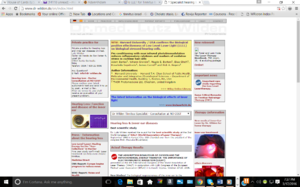The HARVARD Study below has absolutely nothing at all to do with LLLT and Tinnitus.
It only indicates potential bio-chemical processes in NEWBORN MICE; under a clinical controlled laboratory environment, the Blocking of certain molecular activities showed to induce hair cell differentiation limited to very low frequencies.
What in the World does this study and the mechanism of action have to do with WILDEN and his LLLT business.
This study is just a "baby window" for future research, nothing to do with LLLT.
Unfortunately, I am now convinced that Wilden is another con artist living high on the hog. Putting this article on his website serves no purpose except to make incorrect correlations.
---------------------------------------------------------------------------------------------------------------------------
Harvard researchers regenerate sound-sensing cells of mice with hearing damage
February 21, 2014
Harvard stem cell scientists have made an unexpected and potentially useful discovery that the sound-sensing cells of the mammalian ear—called hair cells--can be replaced, at least at low levels. Despite years of evidence indicating that ear sensory cells do not regenerate if lost, new research from the laboratory of
Albert Edge, PhD, shows that it is possible for newborn mice.
The next step is to learn if the findings can be applied to older animals, which may lead to ways to help stimulate cell replacement in adults and to the design of new treatment strategies for people suffering from deafness due to hair cell loss.
"The finding that newborn hair cells regenerate spontaneously is novel," said Edge, a Harvard Stem Cell Institute Affiliated Faculty member at
Harvard Medical School and the
Massachusetts Eye and Ear Infirmary.
The team's previous research revealed that the induced inhibition of a set of proteins that control neuron division—known as the Notch signaling pathway—increases hair cell differentiation, and can help restore hearing to mice with noise-induced deafness.
In their latest work, published in
Stem Cell Reports, the investigators found that
blocking the Notch pathway in supporting cells near the ear that express a protein called Lgr5 can also lead to hair cell differentiation, mimicking the natural hair cell regeneration observed in the newborn mice.
"By using an inhibitor of Notch signaling, we could push even more cells to differentiate into hair cells," said Edge. "It was surprising that the Lgr5-expressing cells were the only supporting cells that differentiated under these conditions."
Combining this new knowledge about Lgr5-expressing cells with the previous finding that Notch inhibition can regenerate hair cells will allow the scientists to design new hair cell regeneration strategies to treat hearing loss and deafness.
HSCI Principal Faculty member
Konrad Hochedlinger, PhD, was a collaborator with Edge on the study.
The research was supported by the
National Institutes of Health, an NIH Ruth L. Kirschstein National Research Service Award, the Tillotson Corporation, the Shulsky Foundation, and Robert Boucai.
Cited:
Lgr5-Positive Supporting Cells Generate New Hair Cells in the Postnatal Cochlea.
Stem Cell Reports.February 20, 2014. [Epub ahead of print]
This story was provided by Cell Press.
See also:
2014,
Research Update,
Hearing Loss
 Member
Member
